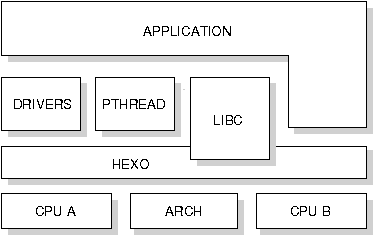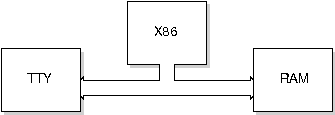| Version 2 (modified by , 14 years ago) (diff) |
|---|
MutekH as Unix process quick start guide
This guide explain how to run MutekH embedded in a Unix process. This is the simplest way to run MutekH as it doesn't require any hardware platform.
Overview
The MutekH operation system is built on top of the Hexo hardware abstraction layer. It's composed of several modules and libraries.

When compiled to run embedded in a Unix process, minimal hardware ressource are needed: The host processor and unix process memory are used as execution platform and a simple TTY driver redirect output to the Unix terminal.
It enables running MutekH natively on the host processor. This configuration suffer from several limitations regarding available peripherals, but it is usefull to test and debug algorithms.

Getting the sources
The example below show how to run MutekH using this configuration, it only requires to get the MutekH source code.
The MutekH source code is fully configurable and can be tweaked to adapt hardware platform and application needs. Configuration is handled by a dedicated tool which check dependencies and other relationships between the large set of available configuration tokens.
svn co -r 1024 https://www-asim.lip6.fr/svn/mutekh/trunk/mutekh
Source tree is organized this way:
mutekh |-- arch contains hardware platforms modules for hexo |-- cpu contains processors modules for hexo |-- doc documentation |-- drivers device and filesystem drivers |-- examples Test and example programs |-- gpct container library, available as a separate project |-- hexo Hexo hardware abstraction layer |-- libc standard C library |-- libm standard math library |-- libnetwork netwotk stack |-- libpthread posix thread library |-- libvfs virtual File System |-- mutek hardware independant kernel code |-- scripts build system scripts `-- tools some usefull tools
More directories are actually available with other libraries and features.
Writing the example source code
Note: This example is available directly from examples/hello directory in source tree: trunk/mutekh/examples/hello
- Creating a new modules directory
mkdir hello cd hello
- Writing the source code in
hello.c#include <pthread.h> pthread_mutex_t m; pthread_t a, b; void *f(void *param) { while (1) { pthread_mutex_lock(&m); printf("(%i) %s", cpu_id(), param); pthread_mutex_unlock(&m); pthread_yield(); } } int main() { pthread_mutex_init(&m, NULL); pthread_create(&a, NULL, f, "Hello "); pthread_create(&b, NULL, f, "World\n"); }
- Writing the
Makefileobjs = hello.o
Writing the MutekH configuration file
Our configuration file is named hello/config_emu.
Details about configuration file is explained later.
This configuration file describe the following things:
- The application license, used to check license consistency for modules in use,
- The target hardware platform and processor
- Use of the POSIX threads library
- Use of terminal output
- Declaration of a new "hello" modules
The MutekH source code is split in modules. We now have to declare our new module to have it compiled along with the kernel by the build system. As modules may be located out of the source tree, we have to specify the module directory.
# New source code module to be compiled CONFIG_MODULES examples/hello:%CONFIGPATH # Application license CONFIG_LICENSE_APP_LGPL # Platform types CONFIG_ARCH_EMU CONFIG_ARCH_EMU_LINUX # Processor types CONFIG_CPU_X86_EMU ...
The complete configuration files are available here: trunk/mutekh/examples/hello/config_emu and trunk/mutekh/examples/hello/config_emu64. You must choose the right one depending on your host operating system and architecture.
Compiling the application along with MutekH
Simply type something like:
make CONF=examples/hello/config_emu
Once the compilation process has finished, the executable binary is available:
kernel-emu-x86-emu.out
Execution
Simply execute the program as a normal unix executable:
$ ./kernel-emu-x86-emu.out (0) Hello (0) World (0) Hello (0) World (0) Hello (0) World (0) Hello (0) World ...
Other more advanced topics and guides are available from the Main page.

